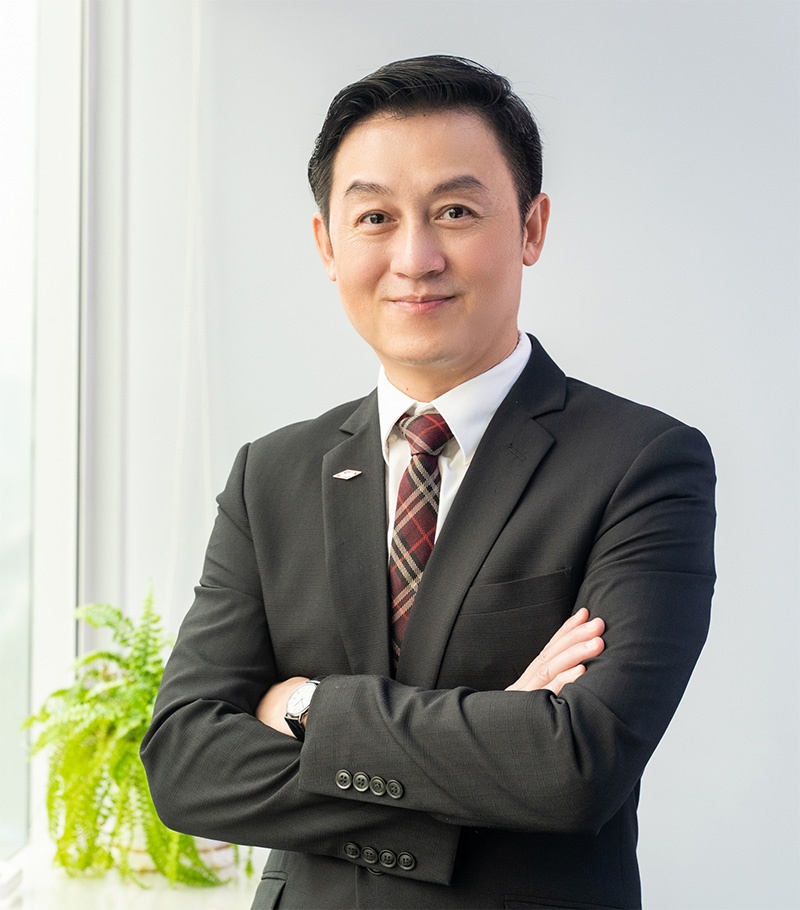Dow Vietnam committed to Vietnam's sustainability
 |
| Ekkasit Lakkananithiphan, president of Dow Vietnam |
As one of the prominent companies focusing on green technology, how has Dow Vietnam contributed to the country’s sustainability goals?
As a global materials science company, we have primary sustainability goals. The first is to protect the climate, in which we implement and advance technologies to manufacture our products using fewer resources for carbon neutrality by 2050. And to tackle the plastics pollution, our goal is also to stop the waste and focus on investments in key technologies and infrastructure to significantly increase global recycling.
By 2030, we aim to have one million metric tons of plastic collected, reused, or recycled globally through direct actions and partnerships. The next goal is to close the plastics loop by enabling all Dow products sold in reusable or recyclable packaging applications by 2035.
In Vietnam, our focus is to educate people to change behaviours and segregate waste at its source and provide solutions to recycle plastic waste. We currently have two projects running in partnership with the Vietnamese government to tackle the plastic waste issue. The first one was kicked off in 2021 and is being implemented in the Hoan Kiem district in Hanoi, targeting low value and hard-to-recycle plastic waste.
Possible recycled plastics solutions are recycled plastic road, eco-tile, eco-brick, and recycled pellets. The project is a good example of Extended Producer Responsibility implementation and is expected to be duplicated in other provinces of Vietnam.
 |
| Primary school students in Hoan Kiem district participated in Dow's project |
Aimed to launch in 2022, the second project, Zero Waste to Mekong River, is a water-based waste management system based in Can Tho, covering both plastic and organic waste.
Through partnerships with authorities and some NGOs, Dow is positioning this project to be a flagship model for the recently established public-private collaboration. The project’s outcome will contribute to the government’s targets of reducing 50 and 75 per cent of ocean plastic waste in 2025 and 2030, respectively.
In addition, to better serve our Vietnamese customers as well as provide more innovative and sustainable solutions to Vietnam, Dow is working on new future investment projects, including the establishment of the Center for Innovation and R&D in the near future.
During COP26, the Vietnamese Prime Minister announced the country’s bold commitment to combat climate change and achieve net-zero emissions by 2050. What are Dow’s key takeaways from the COP26? What can we expect to see going forward at COP27?
For Dow, participation in events such as COP26 is important, because we understand and embrace our responsibility to reduce global carbon emissions, and have committed to achieving net carbon neutrality by 2050. We have plans to renew our manufacturing fleet in a strategic way that helps us maintain our cost advantage while reducing carbon emissions. In October 2021, we announced plans to build the world’s first zero-carbon ethylene and polyethene complex at our Fort Saskatchewan, Alberta, facility.
The project will convert emitted gas into clean hydrogen fuel and capture and store CO2 emissions while tripling production at the site and taking the entire site to near-zero Scope 1 and 2 CO2 emissions. We also have plans to reduce CO2 emissions by 40 per cent by 2030 at our operations in Terneuzen, the Netherlands, using circular hydrogen.
Globally by 2030, Dow aims to reduce its net annual carbon emissions by 5 million metric tons versus its 2020 baseline (15 per cent reduction). By 2050, Dow intends to be carbon neutral.
Besides, greater use of recycled materials is emerging as a way to get to the next level of sustainable manufacturing and tackle climate change. Moving to a more circular economy is essential if we are to meet the Paris Agreement targets.
Currently, how much of your product portfolio and plastic packaging is reusable or recyclable?
We currently estimate that more than 80 per cent of our packaging sales come from products that are recyclable or reusable. We have technology in implementation for another 10 per cent, and the remaining would require new innovation.
We are currently investing in some advanced recycling technologies that will help produce eco-friendly alternatives. An example would be our partnership with Fuenix Ecology Group in Europe for the supply of a new feedstock made from recycled plastic waste to produce new Dow polymers, and other partnerships focusing on bio-based materials. Dow is a key member of a number of initiatives that transform waste into valuable fuels.
What are some of the challenges of maintaining a high standard of sustainability and achieving this impressive result?
In our production process, one of the ways we cope is through digital transformation. For example, we are starting to use drones instead of people in a lot of our manufacturing sites, to operate at lower cost and with higher safety and social-distancing standards.
Another change we see during the pandemic is in consumers' behaviour. While minimising plastic waste was somewhat a priority before the pandemic, it has forced everyone to use more packaging and more medical tools that are plastic.
The masks we are wearing right now are plastic. Despite the rising demand for plastic use, Dow wants to emphasise the need for an effective system of plastic waste management. We will continue to promote the plastic circular economy concept, from advanced recycling to recyclability and bio-based plastics designs, and are constantly bringing in technology to help Vietnam achieve its environmental goals.
What recommendations does Dow have for the government to accelerate its green transition process, particularly in terms of legal framework?
In general, Dow advocates for carbon-neutral policies. We believe that a market-based, economy-wide price on carbon if structured well, is one of the most effective policies to address climate change. The best policies should reduce CO2 emissions at a reasonable cost.
Overall, we urge that policies incentivise innovation to drive emissions reductions, encourage transparent disclosure of risks and management of climate impact, and use climate change metrics in alignment with the TCFD recommendations.
| Dow is a materials science company and solutions provider. Founded in 1897 and present in Vietnam since 1995, the company is now operating in three locations: a headquarters office in Ho Chi Minh City, a representative office in Hanoi, and a coating materials manufacturing site in Dong Nai, providing packaging products, infrastructure, and mobility and consumer applications. Dow is currently employing more than 100 people in Vietnam. Dow’s products are essential inputs to many downstream and supporting industries in Vietnam. The company envisions becoming a key partner of Vietnam’s economic growth and prosperity for the long term, by driving innovations that help enhance sustainability in Vietnam’s industries. |
What the stars mean:
★ Poor ★ ★ Promising ★★★ Good ★★★★ Very good ★★★★★ Exceptional
 Tag:
Tag:
Related Contents
Latest News
More News
- Bac Ai Pumped Storage Hydropower Plant to enter peak construction phase (January 27, 2026 | 08:00)
- ASEAN could scale up sustainable aviation fuel by 2050 (January 24, 2026 | 10:19)
- 64,000 hectares of sea allocated for offshore wind surveys (January 22, 2026 | 20:23)
- EVN secures financing for Quang Trach II LNG power plant (January 17, 2026 | 15:55)
- PC1 teams up with DENZAI on regional wind projects (January 16, 2026 | 21:18)
- Innovation and ESG practices drive green transition in the digital era (January 16, 2026 | 16:51)
- Bac Ai hydropower works stay on track despite holiday period (January 16, 2026 | 16:19)
- Fugro extends MoU with PTSC G&S to support offshore wind growth (January 14, 2026 | 15:59)
- Pacifico Energy starts commercial operations at Sunpro Wind Farm in Mekong Delta (January 12, 2026 | 14:01)
- Honda launches electric two-wheeler, expands charging infrastructure (January 12, 2026 | 14:00)



















 Mobile Version
Mobile Version